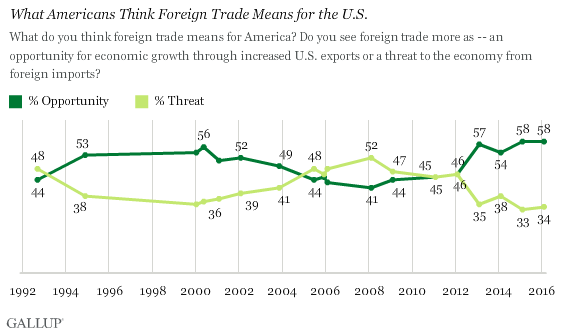Moreover, in a Gallup poll earlier this year, a strong majority of Americans are more likely to perceive foreign trade as an opportunity for growth than as a threat. Moreover, the pro-trade majority has been rising since 2008. I do need to add in passing that pretty much all economists would view the specific Gallup question, which assumes that exports benefit the US economy and imports threaten it, as a fundamentally wrong-headed view of why an economy benefits from trade. But there are similar pro-trade majorities in other polls, like this recent NBC News/Wall Street Journal poll,

Doug Irwin offers a useful overview of the pro-trade position in his essay in the July/August 2016 issue of Foreign Affairs, "The Truth About Trade: What Critics Get Wrong About the Global Economy." He writes: "By and large, the United States has no major difficulties with respect to trade, nor does it suffer from problems that could be solved by trade barriers. What it does face, however, is a much larger problem, one that lies at the root of anxieties over trade: the economic ladder that allowed previous generations of lower-skilled Americans to reach the middle class is broken."
My usual way of making this point is to argue that international trade, and in particular arguments over the details of trade agreements, is an easy scapegoat for more profound and harder-to-tackle economic dislocations. I'd be delighted if America's economic issues could be resolved by, say, renegotiating or just not signing some trade agreement. But I don't believe. it.
Irwin works through many of the concerns raised about international trade, like those who mistakenly believe that the US trade deficit was a main cause of job loss during the Great Recession. He writes:
In fact, the trade deficit usually increases when the economy is growing and creating jobs and decreases when it is contracting and losing jobs. The U.S. current account deficit shrank from 5.8 percent of GDP in 2006 to 2.7 percent in 2009, but that didn’t stop the economy from hemorrhaging jobs. And if there is any doubt that a current account surplus is no economic panacea, one need only look at Japan, which has endured three decades of economic stagnation despite running consistent current account surpluses.But to me, Irwin's key point is that the big underlying issue disrupting the US economy is technological change. Indeed, the changes in communication, logistics, transportation, and information processing are dramatically altering the US economy all by themselves. Indeed, developments in technology are a large part of what make global supply chains viable in the first place.International trade is part of the picture, too, but competition from robots and computers are ultimately a bigger disruptor than competition from workers in China or India. Irwin writes:
"Although imports have put some people out of work, trade is far from the most important factor behind the loss of manufacturing jobs. The main culprit is technology. Automation and other technologies have enabled vast productivity and efficiency improvements, but they have also made many blue-collar jobs obsolete. One representative study, by the Center for Business and Economic Research at Ball State University, found that productivity growth accounted for more than 85 percent of the job loss in manufacturing between 2000 and 2010, a period when employment in that sector fell by 5.6 million. Just 13 percent of the overall job loss resulted from trade, although in two sectors, apparel and furniture, it accounted for 40 percent.
"Although the United States boasts a highly skilled work force and a solid technological base, it is still the case that only one in three American adults has a college education. In past decades, the two-thirds of Americans with no postsecondary degree often found work in manufacturing, construction, or the armed forces. ... Over time, however, these opportunities have disappeared. Technology has shrunk manufacturing as a source of large-scale employment: even though U.S. manufacturing output continues to grow, it does so with many fewer workers than in the past. Construction work has not recovered from the bursting of the housing bubble. And the military turns away 80 percent of applicants due to stringent fitness and intelligence requirements. There are no comparable sectors of the economy that can employ large numbers of high-school-educated workers.
"This is a deep problem for American society. The unemployment rate for college-educated workers is 2.4 percent, but it is more than 7.4 percent for those without a high school diploma—and even higher when counting discouraged workers who have left the labor force but wish to work. These are the people who have been left behind in the twenty-first-century economy—again, not primarily because of trade but because of structural changes in the economy. Helping these workers and ensuring that the economy delivers benefits to everyone should rank as urgent priorities. But here is where the focus on trade is a diversion. Since trade is not the underlying problem in terms of job loss, neither is protectionism a solution."I confess that I have my "stop the world, I want to get off" moments. But the rest of the world economy isn't going to stop. Whether or not the disruptive effects of technology continue to moves ahead in the US, technology is going to be developed and adopted elsewhere. If the US decides to take political actions to reduce its exposure to foreign trade, other countries are going to keep signing such agreements and building global supply chains. There are real challenges for how to create ladders of opportunity for successful careers--not just jobs paid by the hour--for workers across the spectrum of education and skills. And there are legitimate policy disputes concerning the fine print of what's in various trade agreements. But backing away from technology and the global economy is not a successful path to prosperity.
